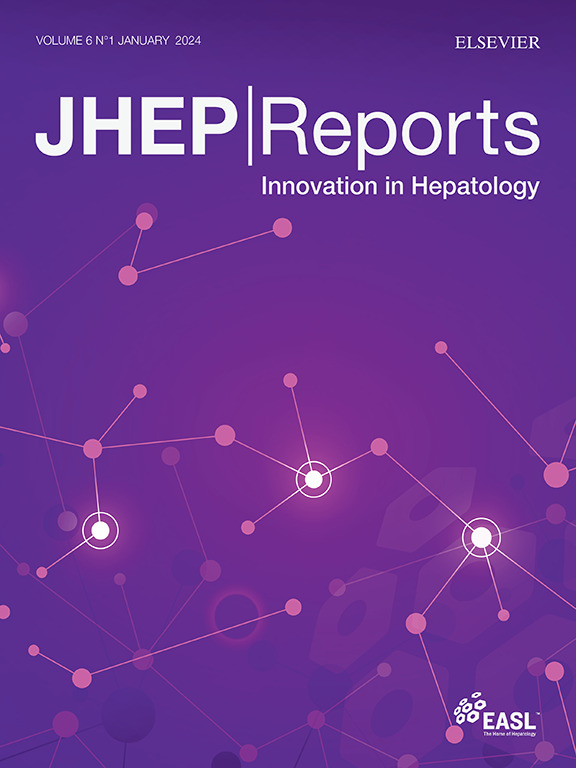Progressive systemic inflammation precedes decompensation in compensated cirrhosis
IF 9.5
1区 医学
Q1 GASTROENTEROLOGY & HEPATOLOGY
引用次数: 0
Abstract
Background & Aims
Systemic inflammation is a driver of decompensation in cirrhosis with unclear relevance in the compensated stage. We evaluated inflammation and bacterial translocation markers in compensated cirrhosis and their dynamics in relation to the first decompensation.
Methods
This study is nested within the PREDESCI trial, which investigated non-selective beta-blockers for preventing decompensation in compensated cirrhosis and clinically significant portal hypertension (CSPH: hepatic venous pressure gradient ≥10 mmHg). Blood biomarkers were measured at baseline and at 1 and 2 years in patients who remained compensated and had available samples (n = 164). Values of patients with CSPH were split at each time point by decompensation development in the next time interval after sampling. We also included 54 patients with cirrhosis and subclinical portal hypertension (PH) and 35 controls. We assessed markers of inflammation (interleukin-6 [IL-6], tumor necrosis factor-alpha, von Willebrand factor [vWF], C-reactive protein), macrophage activation (CD14, CD163), intestinal barrier integrity (fatty acid-binding protein [FABP], haptoglobin), and bacterial translocation (lipopolysaccharide [LPS]).
Results
IL-6, CD163, and vWF were higher (p <0.01) at baseline in patients with cirrhosis and CSPH compared to those with subclinical PH and controls. IL-6 increased (p <0.05) at 1 year in patients with CSPH, with a greater rise in those who developed decompensation. CD163 was higher (p <0.01) in patients who decompensated at baseline and 1 and 2 years. FABP was elevated (p <0.01) in patients with CSPH compared to subclinical PH and controls at baseline and 1 year, while haptoglobin was lower (p <0.01). LPS was higher (p <0.01) in patients with CSPH than in those with subclinical PH and controls and increased at 1 year regardless of decompensation development.
Conclusions
Inflammation and bacterial products are present in the systemic circulation in patients with compensated cirrhosis and CSPH. Progressive inflammation precedes the first decompensation.
Impact and implications
Systemic inflammation drives cirrhosis progression during the decompensated stage, but its role in the compensated stage is unclear. We evaluated biomarkers of systemic inflammation, intestinal barrier integrity and bacterial translocation in patients with compensated cirrhosis and their dynamics in relation to the first decompensation. We demonstrate that low-grade inflammation and bacterial products are present in the systemic circulation in compensated cirrhosis, provided clinically significant portal hypertension has developed. We also show that worsening of systemic inflammation precedes the development of first clinical decompensation.

求助全文
约1分钟内获得全文
求助全文
来源期刊

JHEP Reports
GASTROENTEROLOGY & HEPATOLOGY-
CiteScore
12.40
自引率
2.40%
发文量
161
审稿时长
36 days
期刊介绍:
JHEP Reports is an open access journal that is affiliated with the European Association for the Study of the Liver (EASL). It serves as a companion journal to the highly respected Journal of Hepatology.
The primary objective of JHEP Reports is to publish original papers and reviews that contribute to the advancement of knowledge in the field of liver diseases. The journal covers a wide range of topics, including basic, translational, and clinical research. It also focuses on global issues in hepatology, with particular emphasis on areas such as clinical trials, novel diagnostics, precision medicine and therapeutics, cancer research, cellular and molecular studies, artificial intelligence, microbiome research, epidemiology, and cutting-edge technologies.
In summary, JHEP Reports is dedicated to promoting scientific discoveries and innovations in liver diseases through the publication of high-quality research papers and reviews covering various aspects of hepatology.
 求助内容:
求助内容: 应助结果提醒方式:
应助结果提醒方式:


